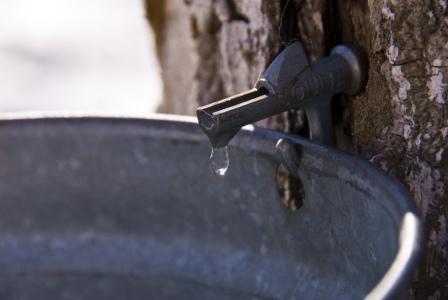By Michelle Werts
Have you loved this year’s unseasonable warm winter? Yes? Well, I have another question for you: Is that happiness worth the loss of maple syrup on your pancakes and waffles?

While snow and freezing temperatures are cumbersome for us humanoids, they’re essential for maple-syrup producers across the country. In fact, without freezes, we’d be out of luck when it comes to maple syrup. You see, maple-tree sap only flows during a short window each winter and spring, a window in which temperatures drop below freezing overnight and rise above it during the day. When temperatures rise above freezing, the flow of sap begins, and for eight to 15 hours, it will continue until eventually drying up. This is when the freeze is needed: Overnight, the sap freezes and the tree rejuvenates, so come morning’s thaw, it’s ready to flow again. Without this delicate dance, there would be no sap, and with no sap, there is no maple syrup. And once the first spring bud appears on the maple trees, the jig is up, as any sap collected then will not produce the tasty syrup we all know and love.

As reported by the Associated Press, some maple-syrup farmers began tapping their trees in early February, nearly a month earlier than normal. And, so far, so good. But one really warm day could ruin it all, especially with hardly any snow cover to insulate the ground and keep temperatures lower in our tree-tapping forests. Therefore, let’s all hope for another month of freezing nights for our maple-syrup farmers who need to tap 40 gallons of sap to produce one gallon of syrup. Without those nightly freezes, the maple-industry across the country might suffer losses. For an industry that generates tens of millions of dollars each year (make that thousands of millions when you factor in associated business like retailers, packaging, equipment producers, etc.) and supplies about 20 percent of the world’s maple syrup, that wouldn’t be a good thing.